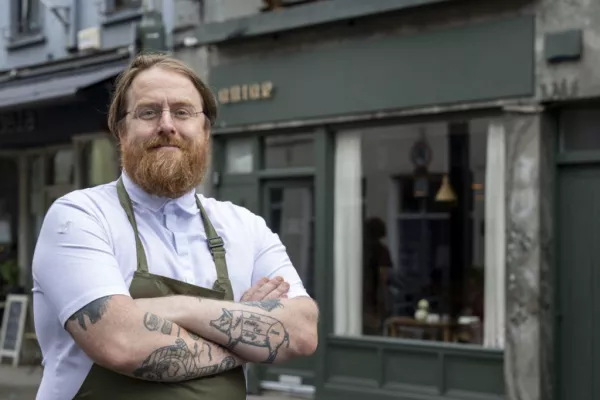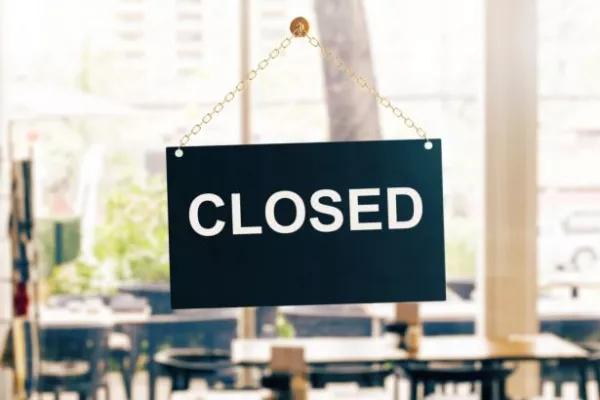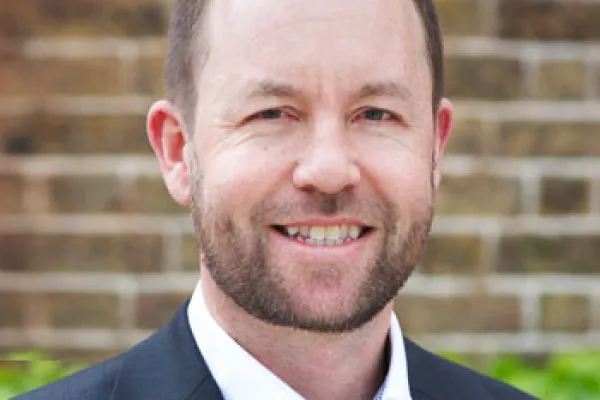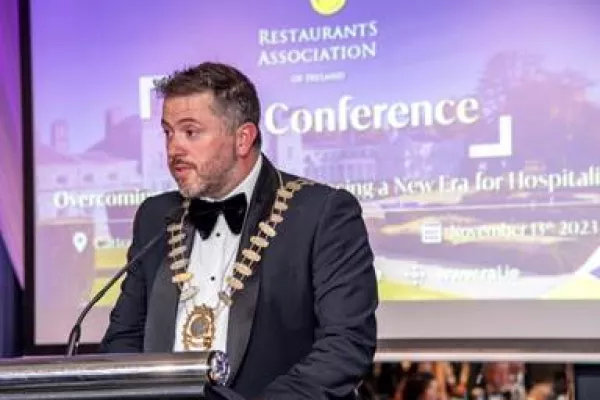JP McMahon speaks to Robert McHugh about what the future will hold for the Galway Food Festival and the Food On The Edge symposium.
JP McMahon was last month named as the Galway Chamber of Commerce President’s Award nominee. The award is presented to someone who has had an exceptional impact on Galway City, the region, and his/her/their sector.
McMahon is the owner and culinary director of the Michelin-starred Aniar restaurant and the award-winning Spanish restaurant Cava Bodega. Aniar is home to the Aniar Boutique Cookery School, where McMahon runs cooking classes for young chefs and adults alike.
The busy chef is also the director, founder, and current chair of the Galway Food Festival and runs Blas na Gaillimhe, the network that promotes the series of festivals, which take place in May and November.
In addition, McMahon founded the award-winning international Food On The Edge symposium. The event features international chefs and people working with food and hospitality from across the globe.
Congratulations on being recognised with the Galway Chamber of Commerce President’s Award! How does it feel to receive this accolade?
Well, as I said in my speech, I never consider myself a business person, so it was humbling in one way, and a little bit strange because I think, sometimes, when you are wrapped up in food, you get tunnel vision, and you forget about the circumstances that happen around the production, in terms of the business that you generate and the staff that you employ, and all those things.
I consider myself a food person foremost, and a businessperson second. It was really great to receive it.
Has Galway changed as a food destination in the past few years?
Definitely. I came here in 1999. Since then, there has been a massive change in terms of the wealth of restaurants and award-winning eateries, and the awards that are given by different bodies, whether it’s from Michelin or the McKennas.
It hasn’t been plain sailing. There have been ups and downs. The recession hit restaurants bad, and then Covid. I wouldn’t say it’s in a good place. It’s in a difficult place at the moment because of VAT and wage inflation.
I hope 2024 will see a few more eateries open up around the city. Restaurants are at the frontline of the economy and are always affected when something happens.
You are the current chair of the Galway Food Festival. What will be its big themes for 2024?
Sustainability is always going to be there, whether you want it to there or not – particularly trying to think about it in very practical ways. For us, sustainability around food waste, food production and energy will be important.
I think the local food movement is still really important. The movement itself is probably only about 20 years old, in terms of the grandeur of the standing of local food in Ireland. I think it’s always at risk because of the way we rely on imported goods so much in Ireland. We have a side branch called Blas na Gaillimhe, which is a network to try and connect local producers with customers and restaurants, to create a community. I think that is one of the most important things for me – the food community.
The Food On The Edge symposium has gained a lot of traction since launching in 2015. What can we look forward to in the coming 12 months?
The theme of Food On The Edge this year was storytelling.
Storytelling sometimes gets a bad press in the media around food because we are told the food should speak for itself and the story gets in the way. For providence, you need to tell a food story. You can’t tell the difference between a pigeon from Ireland and France just because it’s on the plate. Sometimes, people get annoyed when waiters or chefs are explaining the food. It can be done too much, but it is really important that the restaurant communicates a story.
Next year, we are thinking something around ‘sense of place’. We haven’t tied it down yet, but it will be connected to the community and local food. We need a balance between globalisation and localism. It’s not that they are at odds with each other – they are complementary.
Globalisation brings so much to the table as well, but if the scales tip too much in globalisation’s favour, food suffers and food producers suffer. I am always amazed at Food On The Edge, when chefs and food entrepreneurs come from all over the world. We all have the same problems. That’s what is really important, trying to get people to realise that we are all in the same boat, and we have to try and bring bigger businesses onboard and marry them with local businesses.
When Hospitality Ireland last interviewed you, you were particularly concerned about high energy costs for restaurants. How do you feel about that issue now, in the winter season?
It is still a big factor. To put it in perspective, our 60-seater restaurant, Cava – for five or six years, our energy costs were very stable, around the €25k mark a year. During the crisis, that went up to €110k. It has come back down to about €60-70k. Even though the crisis is gone and out of the public domain, energy prices are still almost over twice what they were.
It is important that the public realise that because what is driving food up is the things behind it. At the end of the day, restaurants, hotels and cafes can only make money through customers coming in through the door. That is their only source of income. When the minimum wage goes up again in January, it will put a lot of pressure on the whole sector.
People have the perception that they are being ripped off or that Ireland is a rip-off culture. I eat all around, and I don’t think anyone is getting ripped off in the vast majority of restaurants. I think restaurants and hotels are just trying to make a living.
If you look at the Nordic countries, which is where I think we are headed, they are much more expensive than Ireland. The problem is, we always focus on the Mediterranean economies, which have a much different state in terms of energy and wages.
We need to educate customers that wages are going up, and therefore food prices have to go up. The only way for restaurants to pay for wages is with food prices.
The sick-pay legislation is coming in as well. I think it is going to be up to ten days by the end of the decade. That is going to put a lot of pressure on smaller restaurants. Bigger restaurants might be better placed. It is important to support your local cafe, restaurant and hotel at the moment.
I think the recent VAT hike for hospitality was unnecessary. When the VAT rate went up to 4-4.5%, we probably put our prices up 2%. We can’t match the VAT rate while trying to stay competitive. All it is doing is putting pressure on business because they need to look for extra funds for VAT, wages and energy.
It’s a perfect storm. We have seen over 40 food businesses close in November – some of them very high profile, some less so, but they all count. I don’t think the government has an overall strategy for hospitality. I think it’s very much ‘some will go, some will stay.’
If we don’t think about it in a concrete way, tourism will suffer, and that’s big bucks for the government.
Will you have time to write any books in 2024?
I will indeed. I am working on a book at the moment, for Kristin Jensen from Nine Bean Rows, with a provisional title of An Irish Food Story.
It will be less recipe focused and more looking at my own personal food story in Ireland, but also other food stories.
My father made lasagne at home for us. People have grown up with different food influences, other than Irish. It will be a mixture of that and international elements in Irish food.
How will you spend Christmas this year?
We will be closed for three days – on the 24th, 25th and 26th. I’ll probably spend it cooking and relaxing. I will be cooking for eight to ten people in the family. I will just have some nice Pinot Noir, and hopefully there won’t be anything happening in the restaurant for a few days.
What will your new-year resolutions be?
I currently have a personal trainer to assist me. He’s online now. He’s never in front of me. For me, the motivation will be to try and lose a bit of weight and get a bit healthier.
I think it is common in the industry, particularly when you have been working in it so long – your eating habits can get thrown off. It’s trying to get a bit of regulation around that.
So, that’s what I will be hoping for in 2024!








